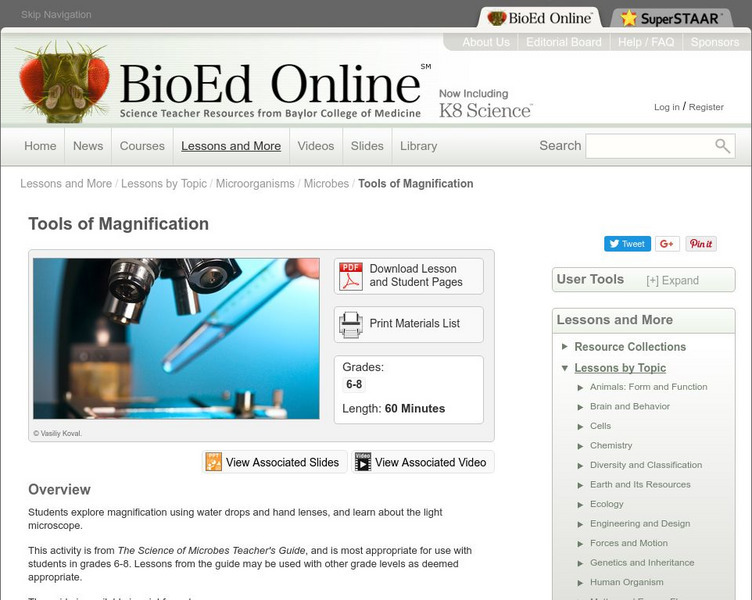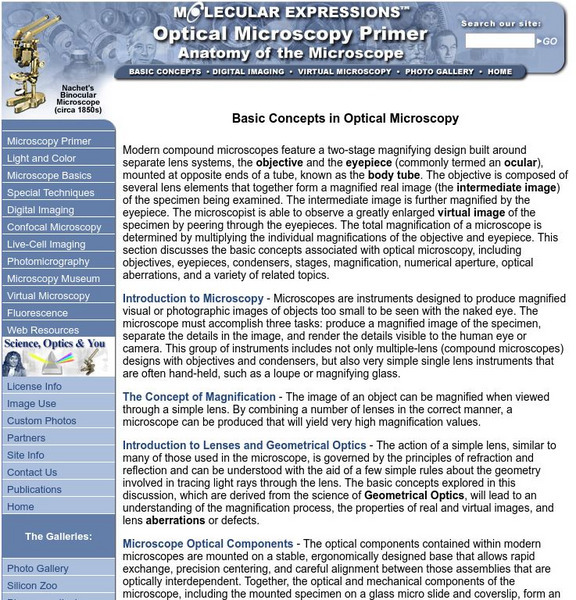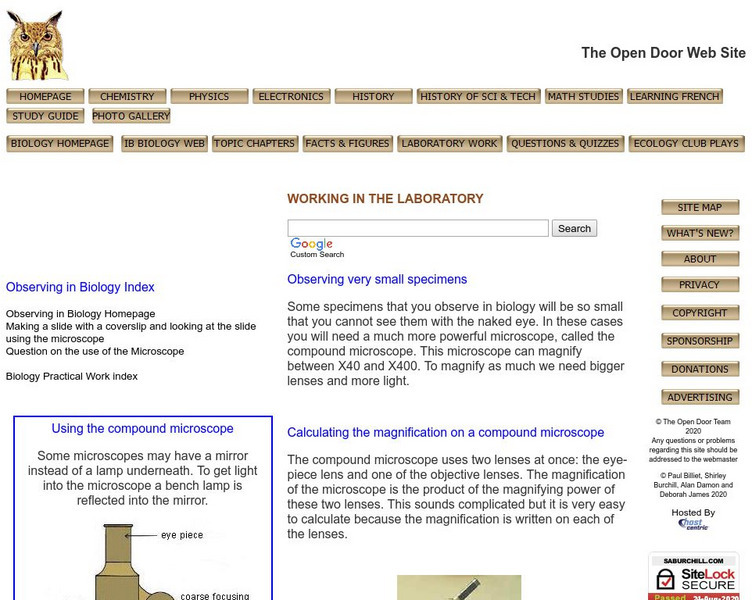Curated OER
Critters in the Classroom
Students investigate with sea urchins. In this ocean habitat lesson, students observe sea urchins and other ocean grazers. Students work with lab equipment to examine the anatomy of these creatures.
Curated OER
Embryological Development Using Medaka Fish
High schoolers analyze and record major events that occur in the development of Medaka fish eggs from fertilization to hatching. In small group, students describe the processes involved, creating a timeline of the major events in the...
Curated OER
The Lunar Disk
Students analyze lunar material using actual moon rocks that were brought back by Apollo astronauts. The teacher and student activity sheets are well-designed.
Curated OER
Using Lines, Dots, And Shapes To Create the Illusion O
Students create the illusion of texture using lines, dots, and shapes in a rendering of an animal.
Curated OER
Matter
Third graders are introduced to the topic of matter. As a class, they brainstorm what they already know about matter and its properties. After completing a worksheet, they participate in an experiment in which they observe matter in...
Curated OER
Indoor Air: What's the Matter?
Students investigate the variety and amount of particulate matter in the air. They locate the general sources of pollution for a specific area and develop some suggestions for improving air quality.
Curated OER
Pond 1: Pond Life
Learners work together to investigate familiar and unfamiliar ecosystems. Using the internet, they discover how different organisms use their environment to satisfy their needs. They also examine the relationshiops between organisms...
Curated OER
Indoor Air: What's the Matter?
Students develop a greater awareness of the variety and amount of particulate matter in the air. They try to locate general sources of pollution for a specific area and develop some suggestions for improving air quality.
Curated OER
Using Magnetotactic Bacteria to Study Natural Selection
Students demonstrate that living organisms may possess incredible adaptations which enable them to survive. They observe bacteria that are able to orient themselves using the Earth's magnetic field and formulate a hypothesis as to how...
BioEd Online
Bio Ed Online: The Science of Microbes: Tools of Magnification
The invention of magnifiers that allow us to see things that are otherwise invisible to us has revolutionized science. In this lesson, young scholars use several types of magnifiers to investigate magnification, and record their...
Nobel Media AB
The Nobel Prize: Microscopes Help Scientists Explore Hidden Worlds
This is a site full of information about various microscopes and the objects and processes scientists study with them. Includes timelines and interactive simulations.
South Carolina Educational Television
Know It All: Microscope | Hobby Shop
In this activity, students use a virtual biology lab to perform investigations and learn lab procedures using compound and dissecting microscopes to look at a variety of animal and plant cells.
Florida State University
Florida State University: Magnification Module
Explore the effect of increasing the magnification on a microscope when viewing various samples such as onion root mitosis.
Georgia State University
Georgia State University: Hyper Physics: Microscope
This site from Georgia State University Physics Department provides a discussion of how light refracts through the lenses of a microscope. Demonstrates the parts of a microscope and includes an interactive form in which the magnifying...
Florida State University
Florida State University: Microscopy Primer: Anatomy of the Microscope
The premier web site on the physics of microscopy. Includes several pages and numerous Java applets about microscopes and refraction. Thorough, well-illustrated, interactive, fun, and educational. What more can one ask for?
Science Struck
Science Struck: Light Microscope vs Electron Microscope: A Comparison
Looks at the differences and similarities between a light microscope and an electron microscope. Discusses their structure, how images are formed, their resolution and magnification, how color is manifested, their portability, cost, and...
PBS
Pbs Learning Media: Microscope Use
Students are asked to explain why scientists need to adjust the position of objects under a microscope.
Other
Microscope Master: How to Use a Microscope
This website gives detailed step-by-step instructions on how to use and adjust a compound microscope.
Optical Society
Optical Society of America: Optics for Kids: Perspectives: Powers of 10
A drawing and measuring activity to give students an appreciation of magnitude in powers of ten, and of microscopes. Students draw themselves and an object life-size, and then examine smaller and smaller pieces of their picture.
Open Door Team
Open Door Web Site: Biology: Calculating Magnification on a Compound Microscope
Learn how to calculate the total magnification of a microscope on this concise site. Links to making a slide, questions on the use of the microscope, and other related microscope topics are included on this site.
Florida State University
Florida State University: Molecular Expressions: Basic Concepts in Optical Microscopy
This site explores the microscope in great detail. Content includes a focus on the microscope's basic functions (including a general diagram), the history of the microscope, each feature of the microscope, differing objectives,...
TOPS Learning Systems
Tops Learning Systems: Top Science: Pinhole Microscope [Pdf]
Create and use a pinhole magnifier.
Museum of Science
Museum of Science: Scanning Electron Microscope (Sem)
View a video or a click-through a slideshow to find out how the SEM works. In addition, find an interesting gallery of magnified images captured with an SEM, links to related sites, and a teacher resource section.
My Science Site
Bj's Science: Microscope Word Search [Pdf]
Site provides a helpful word search teachers can use to help their students familiarize themselves with a microscope and have some fun at the same time.















